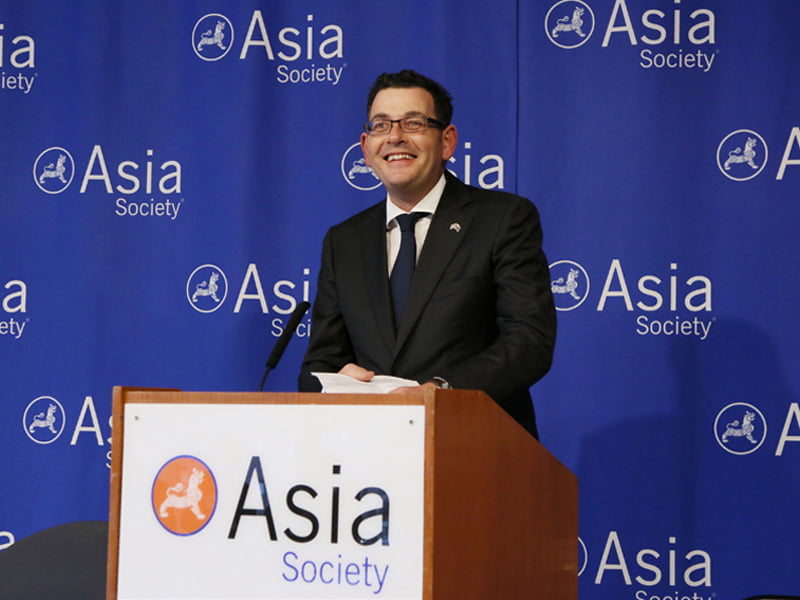The Victorian Government’s push to attract large international tech firms to set up shop in Melbourne has received a $90 million boost as part of the state’s 2017-18 budget.
Unveiled by Treasurer Tim Pallas on Tuesday afternoon, the Andrews Labor Government’s budget focused on combating domestic violence, building infrastructure and continuing job growth in the state.
For the tech and startup communities, the biggest initiative included in the budget is a further $90 million allocated to “attract private sector investment and job creation, and protect existing businesses”.

This is the program that has already attracted big global tech firms like Slack and Zendesk to establish local headquarters in Melbourne with an aim to create jobs, which received $116 million in last year’s budget.
The funding boost was announced last week, and will see Minister for Innovation Philip Dalidakis with much more money at his disposal when looking to entice big tech players to the state.
“Victoria isn’t the state of momentum by accident – it’s because we’re working hard every single day to create new opportunities and new jobs,” Premier Daniel Andrews said.
“We are carrying the nation when it comes to job growth – and investments like these will ensure that the big companies keep choosing Victoria.”
Mrl Andrews said the 2017-18 budget is “fair and reasonable” for Victoria.
“This year’s budget delivers on the things that really matter. Victoria now leads the nation in jobs growth, and we’ll create even more across the state. We’ll make sure every region shares in our success,” he said.
The centrepiece of the budget is a $1.9 billion package aiming to address family violence in Victoria, along with $1.3 billion for education, $2.9 billion for health and $10.1 billion for the infrastructure pipeline.
Small businesses are also set to benefit from an increase to the payroll tax threshold – from $575,000 to $650,000 – which has been brought forward to July next year. The government said this will benefit 38,000 local businesses, with the threshold initially increased to $625,000 in July this year.
Companies that are based in regional Victoria will also receive a further 25 per cent discount from the tax.
Small businesses are a major focus in the budget, Treasurer Tim Pallas said.
“It’s especially important that we invest in our small businesses, whose numbers grew by an additional 15,000 last year. This is a government that values its relationships with business. We want to reduce impediments to their growth so they can develop their operations, expand into new markets and create new jobs,” Mr Pallas said.
Following recommendations from the Small Business Regulation Review, $3.5 million has been pledged to help small businesses in the digital economy. The funding will give these companies “better access to the regulatory information they need”, with Small Business Victoria also improving its online service delivery to more rural regions.
There are few new direct investments in the startup and tech communities aside from the $90 million funding boost, with the state government already committing $60 million in a startup fund that is being delivered by independent body LaunchVic through a series of grants.
But advancements in technology and digital assets underpin many of the big investments in the state budget, including in health and regional development.
As with Victoria’s wider tech and startup push, the budget places emphasis on regional economic development, with a $4 billion package for regional Victoria.
This includes $44.4 million to “safeguard Victoria’s agriculture sector from biosecurity risks” through the implementation of preventative cybersecurity controls and tools to detect suspicious cybersecurity events in 29 Victorian Health Services networks with an aim to improve patient care and safety.
Technological development in regional Victoria is also a major focus, with the $45 million Connecting Regional Communities Program to improve digital infrastructure.
The program will aim to improve access to mobile and broadband technologies to “enable them to participate in the digital economy”.
This includes $11 million for the mobile blackspots program, $12 million for internet-enabled on-farm technologies and $7 million to drive innovation and increase the competitiveness of regional industries.
As part of the funding for education, $84.3 million will be put towards upgrading the IT systems in Victorian schools to provide the technology that is “essential to teaching and learning”.
The government said the upgrade will provide for “reliable access to digital services in the classroom and are essential to teaching and learning”, including improvements to school wi-fi and half a million new computers for students.
The budget included $88.8 million to modernise the state’s energy system, and $155 million to secure its energy supplies and create a “clean sustainable economy”.
The biotechnology industry has also received a $69.2 million boost, with $12.7 million of this set aside for innovative approaches to healthcare, along with funding for medical research and testing.
The budget includes a number of measures aimed at assisting communities and businesses dealing with economic transition and the decline of traditional industries. This includes $15 million for the Future Industries Manufacturing Program and Local Industry Fund for Transition grant programs, for businesses to invest in new manufacturing processes and technologies, and support businesses affected by automotive manufacturing closures.
The Future Industries Construction Technologies Sector Strategy will accelerate the adoption of new technologies across the Victorian construction industry, with a full report and blueprint to be released later this year.
The few new policies announced in the Trade and Innovation portfolio include a $2 million increase in the Victorian government’s staff presence in China and other Asian markets in order to further build international networks in opportunities including health, aged care and medical technologies.
Other digital transformation measures in the budget include an overhaul of the Supreme Court of Victoria’s technology and a $5 million upgrade to ACMI’s Screen World exhibition.
Do you know more? Contact James Riley via Email.

